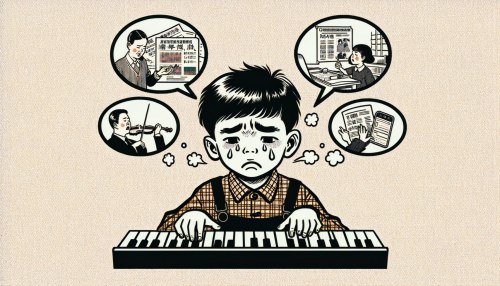The Phenomenon of Extra Classes for Chinese Children
Many people have been saying recently that the collapse of China’s middle class, resulting in children unable to afford piano lessons, is a good thing. Here is my response to this:
This question is not as simple as it seems. Let me explain, as we happen to have some understanding of education both domestically and internationally. The biggest problem with learning and competitions in China is the utilitarian mindset. The academic pressure in China is relatively high, and school life occupies a significant portion of students’ overall time.
Students themselves have very little free time at home. After completing heavy homework, the little 🤏 time they have left is often taken up by their parents. To be honest, it’s quite unfortunate. And we haven’t even talked about additional subjects that children may or may not like. Of course, there are subjects that children are interested in, but in most cases, it’s either what the parents like or what they think will be “useful” for their child’s educational advancement or future job prospects.
Another factor is that the school education system in China focuses more on cultural subjects and lacks sufficient emphasis on physical education, arts, and other abilities. This is why many parents hope to provide their children with additional extracurricular activities if they possess the ability. I cannot fully confirm the situation in the United States since online information may not be entirely accurate, and personal experiences may differ.
As for Canada, the academic pressure in schools is relatively low, and the proportion of purely academic subjects is lower than in China. The curriculum activities are diverse, outdoor activities are abundant, and children have ample opportunities to discharge their energy at school. In terms of class format itself, Canadian schools provide a more comprehensive cultivation of social and interpersonal skills. Teaching resources are also relatively abundant. Schools have resources such as pianos, guitars, swimming pools, and computers for students who are interested in these subjects.
Moreover, teachers would adapt their teaching content based on students’ individual abilities and talents. Children themselves face more comprehensive and diversified challenges and training in school. It’s not as simple as saying “China is strict” or “foreign schools let students do whatever they want.” This results in children having a more all-around comprehensive quality, and parents have less pressure to supplement additional coursework.
In terms of overall lifestyle, Chinese parents tend to be busier and often lack time to take care of their children. They would rather send them to tutoring classes than let them be bored at home, play games, or associate with “bad” children. Canadian parents have shorter working hours and are willing to spend more time with their children. They take their children to local parks, nature reserves, and even camping in the woods on weekends, which is quite common.
The proportion and quality of time spent with children are determined by various factors within society. I’m not against providing extra challenges for talented children, whether it’s in sports, music, or computer-related subjects. What I am against is when parents, out of pure anxiety about education, crazily enroll their children in all kinds of classes without considering the specific circumstances. To be frank, many Chinese parents I know belong to this category.
I have discussed this issue with an education professional friend, and I agree with his perspective. To sum it up simply: “Our own children, whether they have 4 cores or 8 cores, their abilities are there. We shouldn’t overload them like crazy, as it exhausts children, and parents’ time and resources may not be sufficient. Let’s make sure our children operate at 80% of their CPU capacity, rather than neglecting them because they have more freedom.” Of course, there are many ways to achieve this, but parental investment of time is undoubtedly the most important.
In conclusion, whether to enroll children in extracurricular classes cannot be generalized. The current issue in China is not that parents have become enlightened and want to reduce the burden on students; it is more about the collapse of the middle class that used to be eager to “enroll” their children. I believe this is not solely an education issue.
If the setback is merely because parents can’t afford piano lessons, children will still be filled with other lower-cost activities. Also, due to economic structure issues, parents will still be busy, and even if they don’t buy a piano, the quantity and quality of time spent with their children may not necessarily improve significantly. Personally, I don’t agree that it’s a good thing when parents can no longer afford piano lessons or excessively enroll their children, for the reasons mentioned above.
PS: The title image was created by @LeaskH with DALL-E.
